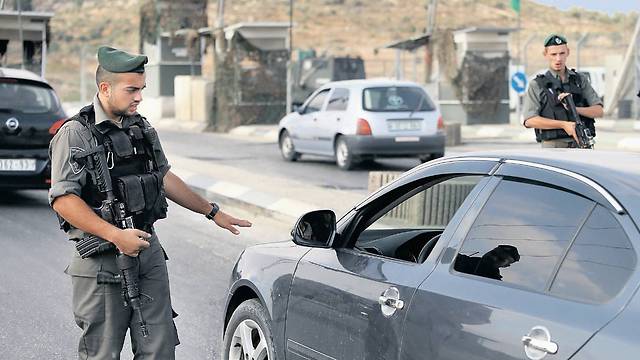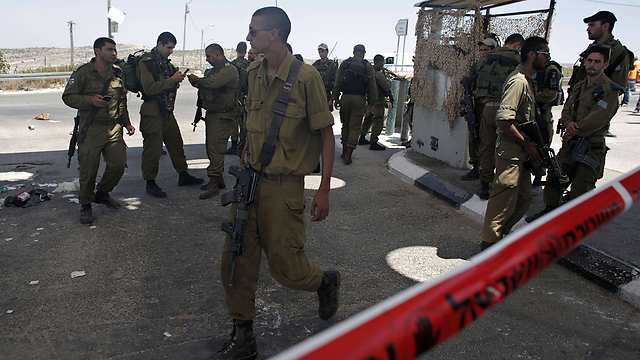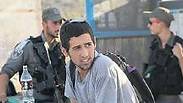
'The most right-wing gov't we could have is acting indecisively'
There is a steep increase in terror attacks in the West Bank, and the settlers are losing their patience. They don't understand why ministers remain quiet, emergency hotlines are plagued with technical issues, and the changes to rules of engagement make it more difficult for troops to open fire; the Palestinians, meanwhile, don't believe the reports on the recent wave of terror attacks.
As we arrive at the Tapuach Junction in the Samaria region in the early evening hours, we head straight to where the stabbing attack on Sunday occurred.
The Tapuach Junction a major and central junction, which is crossed by tens of thousands of people every day. Both Palestinians and Jews travel through this junction, with three lanes leading Palestinian vehicles to checkpoints, and one lane for cars with Israeli license plates, which leads into the junction and doesn't require security checks.
Mahmad Amsha, 24, arrived here from Kafr Rai south of Jenin on Sunday. He got off a Palestinian taxi and advanced towards the Border Police soldiers who regularly man the checkpoints at the junction and claimed he was feeling unwell. The Border Policemen allowed him to approach and when he was close enough, he pulled out a knife and started stabbing one of the soldiers. Another soldier, who was standing nearby, pushed the terrorist back, causing him to momentarily lose his balance. This allowed the stabbed soldier to recover, quickly cock his weapon and shoot Amsha. The terrorist was critically wounded and died shortly thereafter.
Two days later, there are six Border Policemen on the northwestern side of the junction, manning the checkpoints. Three Israeli Police officers are standing next to them, helping with security checks. Two additional Border Policemen are guarding the hitchhiking station in the southwestern part of the junction. Two guard towers, one on the eastern side and the other on the western side, are now manned.
At the hitchhiking station on the eastern side of the junction, right under the guard tower, three Givati soldiers are calling a young Palestinian standing across the road to come over. One of the fighters is securing from the side, with his weapon cocked and ready as the Palestinian stands in front of them and lifts his shirt, to the soldiers' request. Then they ask him for identification.
All of this is happening just 50 minutes away from the Maariv Junction, which also made headlines this week, but for different reasons.
An outsider looking at this scene would find it a very strange one indeed, but this is the reality at the junction. Border Policemen check cars at random, politely but efficiently instructing the drivers what to do: Get out of the car, show us your identification, open the trunk of the car, have a safe journey.
Twenty meters from there, at the hitchhiking station guarded by Border Policemen, settlers are standing behind massive concrete blocks, waiting for a ride home.
One of them, 17-year-old Meir Indor from Ofra, is working in construction in Yitzhar during his summer break. "I'm standing here and thinking a terrorist could come and shoot me," he says. "This is not farfetched, with the Arabs, anything can happen. There's serious terrorism here - stabbings, vehicular attacks, shootings, Molotov cocktails - and the army is not reacting strongly enough. Their response is not serious. People start thinking about retaliating themselves. Not that I would do something like that, not me, but people feel they are not safe.
"And all of this is happening under the rule of a right-wing government, which is absurd. I would actually have preferred a left-wing government with Bibi and Bennett as part of a right-wing opposition. When they sit in the government, they're afraid of making decisions, afraid of the left. When they're in the opposition, they are acting like a real right wing.
"Terrorism has turned into a regular occurrence here and you don't think too much of it anymore. The Arab that's passing by now could, in one moment, jump this Border Policeman and stab him."
Changes to rules of engagement
The proximity of the attacks indicates there is a trend. Within 24 hours, from Saturday to Sunday at noontime, three stabbing attacks occurred in the Binyamin and Samaria regions.
Late Saturday morning, at a checkpoint on Route 443, a 19-year-old Palestinian from the village of Beit 'Anan approached a soldier and asked for a glass of water. As the soldier turned to give him water, the Palestinian stabbed him in the back. Another soldier at the checkpoint shot the Palestinian, lightly wounding him. That evening, on the outskirts of Huwara, a Palestinian stabbed a Border Policeman. Another soldier that was standing nearby shot the stabber and killed him. The next day was the stabbing at the Tapuach Junction.
On Wednesday night, the situation escalated when an explosion shook a small security checkpoint at the entrance to Beit Jala, near Jerusalem. A soldier from the Kfir Brigade was moderately wounded. The perpetrator, who threw the explosive device, escaped the scene and army forces were deployed to search for him.
An hour and a half before that, stones were thrown at a vehicle on Highway 54 near the Atarot Junction, shattering window and raining glass at a two-year-old girl. It was a miracle the baby was only lightly hurt.
This is still not an intifada, but the number of security incidents has been on the rise for several months now. This is how we found ourselves on a journey from the Tapuach Junction to the Beitot Junction on the outskirts of Huwara, and then to the checkpoint on Route 443, and onto the small checkpoint outside Beit Jala, having a hard time keeping up.
Jonathan Simhi, the head of security at the Samaria Regional Council, is showing us a list of security incidents that happened in his area over the past month and a half: 88 incidents of stone and Molotov cocktail throwing, arsons at wooded areas near settlements, and stabbings of security forces. And this is just in the Samaria region.
He says there has been a rise in security incidents for a while now, but the army only started responding to it in earnest about three weeks ago.
"Look a few months back and you'll see that there was hardly any army or Border Police presence in the main junctions and roads. Now they understand that they have to be there, and in increased numbers, in order to give the residents a sense of security. The Border Policeman who was stabbed outside Huwara was in a position manned only three weeks ago. It's a checkpoint that is vital to the sense of security of those traveling from the Tapuach Junction to the eastern Samaria settlements. It's a busy strip of road several kilometers long that crosses Huwara and has only two lanes - one in each direction - and there's a lot of stone throwing at Israeli vehicles there. It's easy to commit an attack there - pull out a knife or hit the gas pedal. It doesn't take more than that."
Do the Jewish settlers have no other way to get to their settlements?
"The residents and the council are pressuring the government to approve and fund the paving of a bypass that would go around Huwara, but right now this idea is stuck."
The planned bypass is six kilometers long and is planned to pass some 300 meters east of Huwara. But there's a reason this idea hasn't gone up for discussion in the government: Most of the lands through which the bypass is supposed to pass are private Palestinian lands. Expropriating these lands could lead to international uproar. Paving that road would also be interpreted as a political statement: A new freeway for the eastern Samaria settlements - Itamar, Har Brakha, Elon Moreh and Yitzhar, which are outside the main settlement blocs and are supposed to be evacuated as part of any diplomatic proposal discussed so far - will signal that Israel has no intention of evacuating any of the Samaria settlements.
So, meanwhile, the settlers have to deal with the current reality on their own.
"The residents insisted on reinforcing the army presence in the area and we passed on the demand to the IDF," Simhi says. "We demanded army presence in junctions throughout the day and night. We also once again went over the safety instructions for driving these roads with the residents, and every resident knows the council's emergency hotline number. The thing is, that for two years we've been dealing with a technical issue that stops calls from reaching the hotline. A resident in the Samaria would call the council's hotline, but get to the one in the Binyamin region. The same thing happens to residents in Binyamin. They call their hotline but they get to us. It causes us to waste precious time when deploying security and rescue forces to the scene, when every second matters."
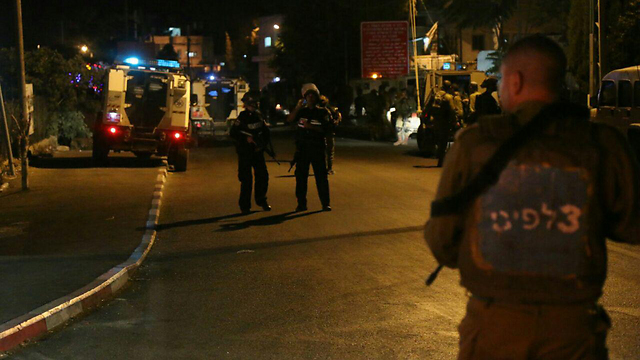
Why aren't you taking care of this issue?
"The technical issue falls under the army's responsibility. We obviously turned to them quite a few times asking them to fix it, but so far it hasn't happened."
And that's not all. Simhi also opposes the changes made to the rules of engagement in the West Bank after an incident in early July when the Binyamin Brigade Commander, Col. Israel Shomer, opened fire at a Palestinian youth who was running away after throwing stones at the commander's car. The young Palestinian, Mohammed al-Kasbah, was killed, which led to rioting. Following that incident, GOC Central Command Roni Numa instructed troops to open fire on stone and firebomb throwers only when there is a clear and immediate danger to their lives. When perpetrators are fleeing, troops are forbidden from shooting to kill.
"It doesn't make any sense," Simhi says. "If in the past you could've opened fire at a stone thrower even after he threw the stone and started running away, now it's forbidden. Good luck catching him now, go play chase with him. These instructions tie the soldiers' hands, and endanger the residents. My concern is that as soon as an officer or a soldier starts thinking twice on whether or not to open fire and what would the legal ramifications of it be, he would rather not do anything. Because of the changes to instructions, we might see a rise in the attacks and in how daring these attacks are."
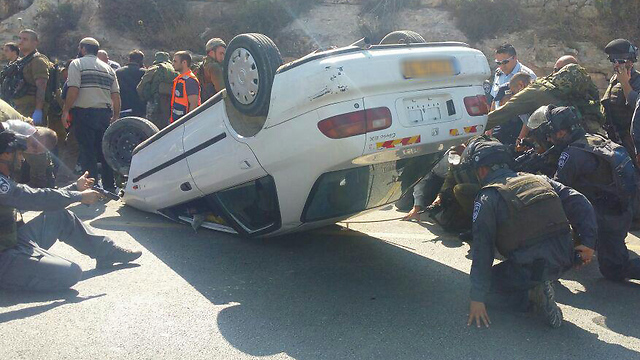
'They were shot for no reason'
We go to Huwara. At one of the village's restaurants we find a copy of al-Hayat newspaper. Under the main headline, there is a photo of Amsha, who was killed on Sunday at the Tapuach Junction, known to the Palestinians as the Zaatara Junction.
A young man called Muntsar translates the main story for us: "It says here that two days ago there was a hot day and the car Amsha was in didn't have air conditioning and he felt unwell. He went out of the car, told the policemen he was feeling dizzy, and they just shot him for no apparent reason." That's the version told on the Palestinian side.
From there, we head to the crossroad that leads to the villages of Beita al-Foka and Beita al-Tahta, a crossroads that on the Israeli side is known as the Beitot Junction. We find two military vehicles there, and a group of soldiers standing nearby. Not far from them, Wahid Zidan, 24, and Madhat Taim, 27, from the village of Qabalan, are standing around at a barbecue restaurant.
"There is no uprising of the resistance," Zidan says. "The resistance is only in Gaza. Here, people get up in the morning and want to make a living. I work in construction in Ramallah and Madhat works at an egg factory at the Barkan Industrial Area."
So how do you explain the recent stabbings of soldiers?
Zidan: "You're the ones who say they tried to stab. We know they were shot for no reason. But look at the life we live - checkpoints everywhere. We're young, we want to go out at night, blow some steam. We go to Ramallah, Jericho, Nablus, and at every checkpoint you're told and asked 'Where are you going?' 'Open your trunk' 'What are you smoking?' 'Empty your pockets.' Who are you to ask me where I'm going and why, or what I'm smoking? What do you care? People get angry because of this. The settlers say we throw stones at them, but they're the ones throwing stones at us. My friend bought a Mercedes for NIS 150,000 and they threw stones at him near Shiloh and his window is gone."
Taim: "Yes, it happened to my uncle and my brother as well. And each window costs NIS 1,500 to replace. Who's paying for that, Israel? Palestine? We pay for this out of our own pockets."
"If they hadn't been standing there," Zidan says and points at the group of soldiers. "No one would've come to them with a knife. Why are they standing here? It's unpleasant for people here."
Security officials define the rise in attacks and attempted attacks as an unorganized "popular awakening." The operations officer at the Border Police's Judea and Samaria Division, Chief Superintendent Yaron Polombo, says his fighters are deployed at junctions and checkpoints to allow both sides, Jews and Palestinians, to travel, go to work and conduct their trade undisturbed.
"The problem is with the lone terrorist. When he commits an attack, he has no infrastructure behind him, no intelligence about his intentions in advance. From questionings of the terrorists who were caught, we learned that their planning time was very short. Meaning, they got up in the morning and left the house with the intention to commit an attack without telling anyone and without any preparations in advance," he says.
The Palestinians are claiming that in some of the recent cases, there was no intention to attack.
"Okay, listen to me, the last few attackers approached the fighters with basic, humanitarian requests. The attacker from Route 443 came to ask for water and when the soldier turned to give him water, he got stabbed. In Tapuach, the attacker put his hand on chest and claimed he wasn't feeling well. The fighters' humane instinct was to help him and when he came near, pulled out a knife and stabbed one of the fighters in the head."
The reinforcement of troops to junctions and checkpoints is tied to the murder of the Palestinian baby and his father in the arson attack in Duma three weeks ago, the operations officer says.
"Beyond the fact this is a horrific incident, operationally speaking it was clear that there will be a retaliatory attack and that's why we increased the troops. When water is spilling out of a boiling pot, you first turn down the flame. We're here inside the boiling water, with the Border Police fighters serving as a human bullet-proof vest. And you're not just a fighter and a bullet-proof vest, you're also required to be a psychologist. Our job is to be the checks and balances of life here. As balances, we allow each side to continue their daily routine. As checks, when an attacker is running with a knife, we have to stop him."
Do the changes to the rules of engagement issued by the GOC Central Command stop you from acting?
"Absolutely not. The instructions are clear to everyone. The moment there is a clear danger to the fighters' life, you are allowed to open fire and neutralize the danger. The changes concern only those who are no longer facing a clear and imminent danger, and even in that case the fighter can assess whether the fleeing perpetrator can pose a danger to those around him. In such a case, the fighter can stop him by firing at the knee and below. But as soon as the danger has passed and it doesn't exist, don't open fire. Very simple."
A senior official in the IDF's Judea and Samaria Division also rejected the criticism over the changes to the rules of engagement.
"There is no confusion or hesitation or a situation in which they don't know what to do," the official says. "The instructions are perfectly clear. When facing a life-threatening situation, you must do whatever it takes to neutralize it. There's no question here. The changes are only regarding situations that are not life-threatening."
"Two months ago, as part of a situation assessment we did, we drilled the fighters in all of the companies about how to respond to a lone terrorist," says Polombo from the Border Police says. "Each class like that was taught by a counterterrorism instructor and a Krav Maga instructor. The fighters practiced combat by hand, how to quickly cock their weapon and aim it at their target in a second without hurting innocent people. You know well what would've happened if they acted unprofessionally under pressure when they were being stabbed. They would've fired indiscriminately out of panic. In both cases when our fighters were attacked, they neutralized the attacker and things went back to normal really fast. The fighters also used their hands to push away the attackers, and made quick and effective use of their weapons."
The army official says that for now, the increased presence of troops will continue, and he too ties it to the arson attack in Duma.
"Has the Duma incident ended? Definitely not. There could still be revenge attacks and we're prepared for that and we're deployed troops all over the area."
Shortly before dark, we return to the Tapuach Junction. Indor from Ofra has already caught a ride and others took his place at the hitchhiking station. He's not the only one to criticize the political leadership. There is a lot of anger among settlers aimed at Bayit Yehudi ministers and the government in general.
Binyamin Regional Council and the Yesha Council head Avi Roeh says he has no complaints towards the IDF and Border Police. "My issue is with the government's policy. There is too much hesitation and not enough decisive action and clear statements. We trust the security forces to know what to do, and the army and police are really doing something. Those who don't do enough and hesitates are the government ministers. On the one hand, this is the most right-wing government you could have, and on the other hand, they demolish Jewish homes here. In a situation like this, the Arabs are saying 'Let's join the party.'"
Did you tell government ministers that?
"Of course. I spoke to Defense Minister Ya'alon. I tried to get to the prime minister and wasn't very successful. I didn't approach Bennett, Shaked or Ariel - who is a resident of the council - but I'm sure they're familiar with the reality and are aware of it. I'm approaching those who have the responsibility - the defense minister and the prime minister. Boogie (Ya'alon) heard me out and listened, but I'm not seeing any results. That's how it is."










